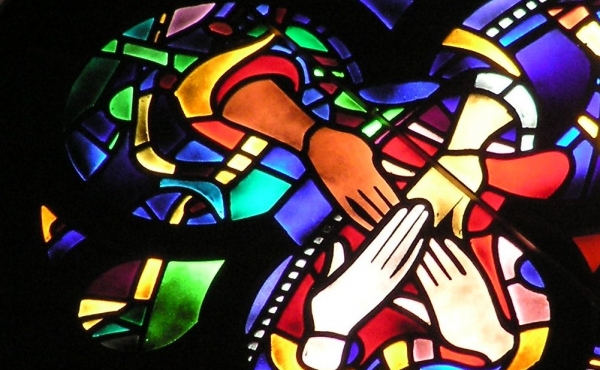June 20, 2019
Navajo Millennial

The word “millennial”, once uttered, causes a reflex of eye rolls. I was not particularly eager to hold the title of being a millennial. The thought of millennials seems off-putting with the generations that came before mine.
I am a Navajo, Second Generation “Cradle” Episcopalian Millennial Woman. What does this mean? It means I am full of hope and wear moccasins and a ton of turquoise to national church functions. As Nadia Bolz-Webber said, “You’re winning in the jewelry category,” at the 2019 Episcopal Communicators Conference. My generation adapted through the rapid advances in technology thus we are more accepting of change and our surroundings.
The Navajo culture is full of traditions and legacies shared through the practice of storytelling. In Navajo creation stories, our very existence was carried by First Man and First Woman as they climbed an endless reed that grew as far as the eye could see into the sky and through three worlds. Escaping the fall of each world, and countless obstacles that were thrown at them, finally bringing us where we are now, the Glittering Fourth World. We co-exist with the land and have mutual respect for all the beings that inhabit the earth. We seek balance in all aspects of our lives.
We deal with historical and generational traumas daily. In our history as Navajo’s, we were forced on the Long Walk, taken away from our land, our livestock killed, children forced to boarding schools, and being chastised for speaking our language. It is an arduous past that we have to face. To this day, talks of age and sex are still frowned upon when it comes to being a church leader. We still need to adapt and accept young people and women as leaders.
In all of my father’s pep talks, he always says, “T'áá hwó' ají t'éego,” It’s up to you.
Life was difficult; I had many obstacles. I grew up half time on the Navajo reservation and half time in the city. Pushing forward, forcing myself to heal and grow was a challenge. When I started volunteering in the church, I got involved with Navajo singing groups, bible studies that had the Navajo and English translation and elders around a table explaining the meaning with love and patience. Listening to the Gospel in Navajo has a much deeper meaning, singing “Jesus Loves Me” in Navajo taught me to learn my language more and helped me appreciate being Navajo. The elders of the church, now gone, have always been proud to share their language in church and advocated to see our Navajo traditions work hand in hand with the Episcopal Church. It was a time of waking up. The Indigenous Ministries of the Episcopal Church helped me become interested in engaging in conversations about Native Americans and being Navajo. Sharing your voice is vital for the world to grow into balance. If we want to see change and be entirely accepted, it is up to us to be the voice. “T'áá hwó' ají t'éego,” It’s up to you.
All of our lives are about growing, adapting, learning, and finding out who we are. We are all blessed with different cultures, heritages, and languages. I have the privilege of growing up on the reservation, in the city, with Navajo traditions, with church customs, and I am proud to be part of the Episcopal Church that sincerely welcomes everyone. I say the Lord’s Prayer in Navajo; I bless myself with cedar smoke starting at my foundation, my feet that are cradled by the mother earth, to my head, that holds the wisdom I have gained thus far. I call the Episcopal Church in Navajoland home.





